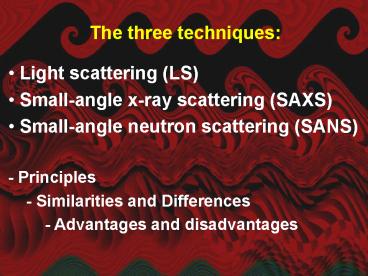The three techniques: - PowerPoint PPT Presentation
1 / 17
Title:
The three techniques:
Description:
Advanced SuperStructures: Scattering & Microscopy (ASSM)? 106. 10-15. 1fm. 10-12. 1pm ... ASSM. atomen & moleculen. protonen, neutronen. quarks. microworld ... – PowerPoint PPT presentation
Number of Views:32
Avg rating:3.0/5.0
Title: The three techniques:
1
- The three techniques
- Light scattering (LS)
- Small-angle x-ray scattering (SAXS)
- Small-angle neutron scattering (SANS)
- - Principles
- - Similarities and Differences
- - Advantages and disadvantages
2
X-rays Light wavelength
Strong absorption
X-rays 0.05-0.15 nm
3
What is in the courseAdvanced SuperStructures
Scattering Microscopy (ASSM)?
microworld
macroworld
X-rays
light
4
Light scattering (LS)
Rayleigh scattering (point scatters ltlt ?)
Intensity is very weak and ? ?-4
Mie scattering on water droplets (comparable to /
larger than ?) Intensity is very strong for
all ?
These are beautiful but non-scientific examples!
Experiments are performed with a single ?
(monochromatic wave) To get quantitative data,
one needs careful index matching! (?n lt 0.1 at
least)
5
Light scattering (LS)
- People usually talk about refractive index, not
the scattering length density (scattering
length density contrast is proportional to ?n). - Not to be forgotten wavelength is a medium is
different! ?medium ?0/n or k0 (2? / ?)n - Also of importance Polarization effects
- Solution use a smart choice of polarization
so that ? ?/2 (90o)
6
X-rays from sealed tube
Cu anode
X-ray intensity
X-rays
V50kV
electrons
K?
K?
hot filament
0
M
L (2s and 2p)
?
K?
Energy levels in Cu atom
K?
K (1s)
7
ESRF, Grenoble (France)
Synchrotron operatesat Ee 6 GeV
Ee ?mc2
mc2 0.5 MeV ? gt 104 v 0.999999996 c
8
Source at BM-26 DUBBLEbending magnet
?-1 10-4 rad
(vertically)
Even broader fan horizontally
9
Synchrotron radiation
Electron beam of energy E
Characteristic energy, Ec
E is in GeV , B is in T
Undulator
10
Typical optical scheme of DUBBLE
11
ESRF and Institut Laue Langevin
12
Production of neutrons
de Broglie
Initial neutron energy ?1 MeV ? 0.0003 Å (not
useful!)
13
ISIS Neutron Source
14
Neutron Velocity selector
15
ILL D22
16
Neutron scattering lengths
Very bad
Very good
1 barn 10-28 m2
17
Summary
- (static) LS
- Cheap, compact good for large-scale
- Too small K-range, multiple scattering,
absorption - Synchrotron SAXS
- Single scattering, large K-range, high
brightness - Expensive, low sensitivity to small atoms
- SANS
- Sensitivity to small atoms, large K-range,
contrast variation - Expensive, low intensity, incoherent background































